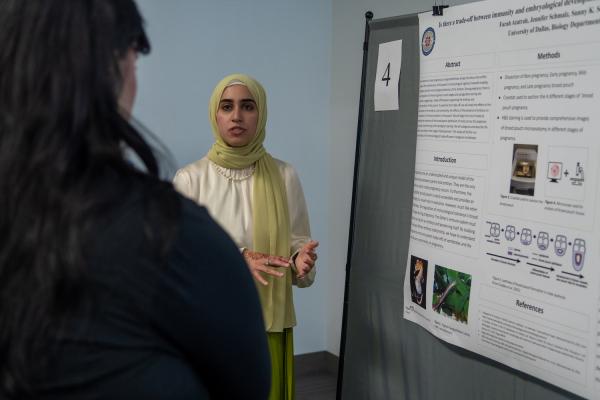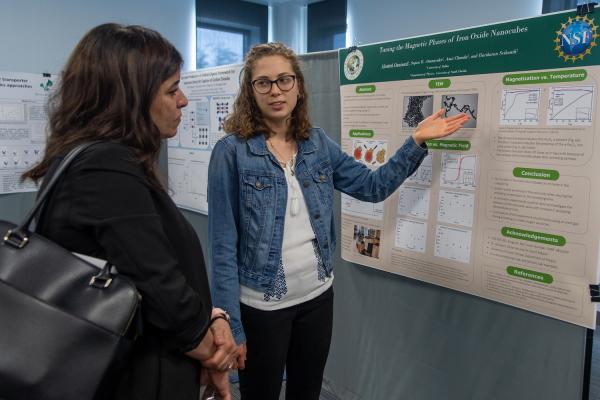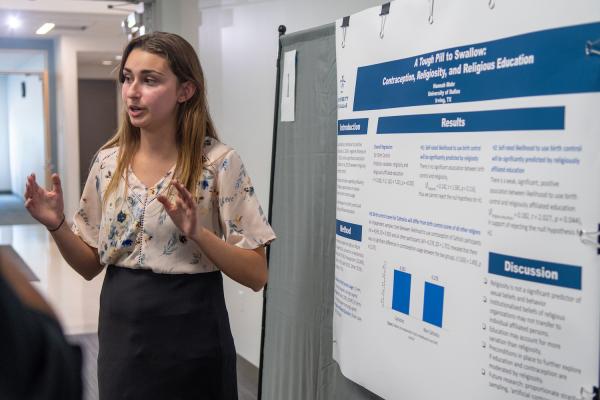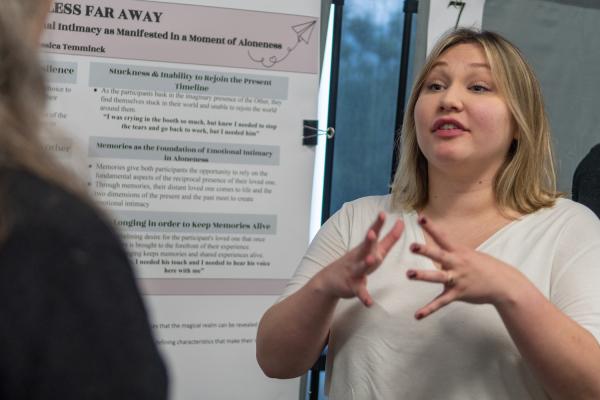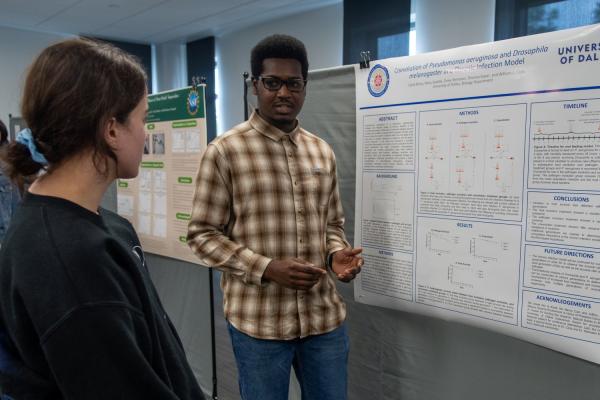 Menu
Menu
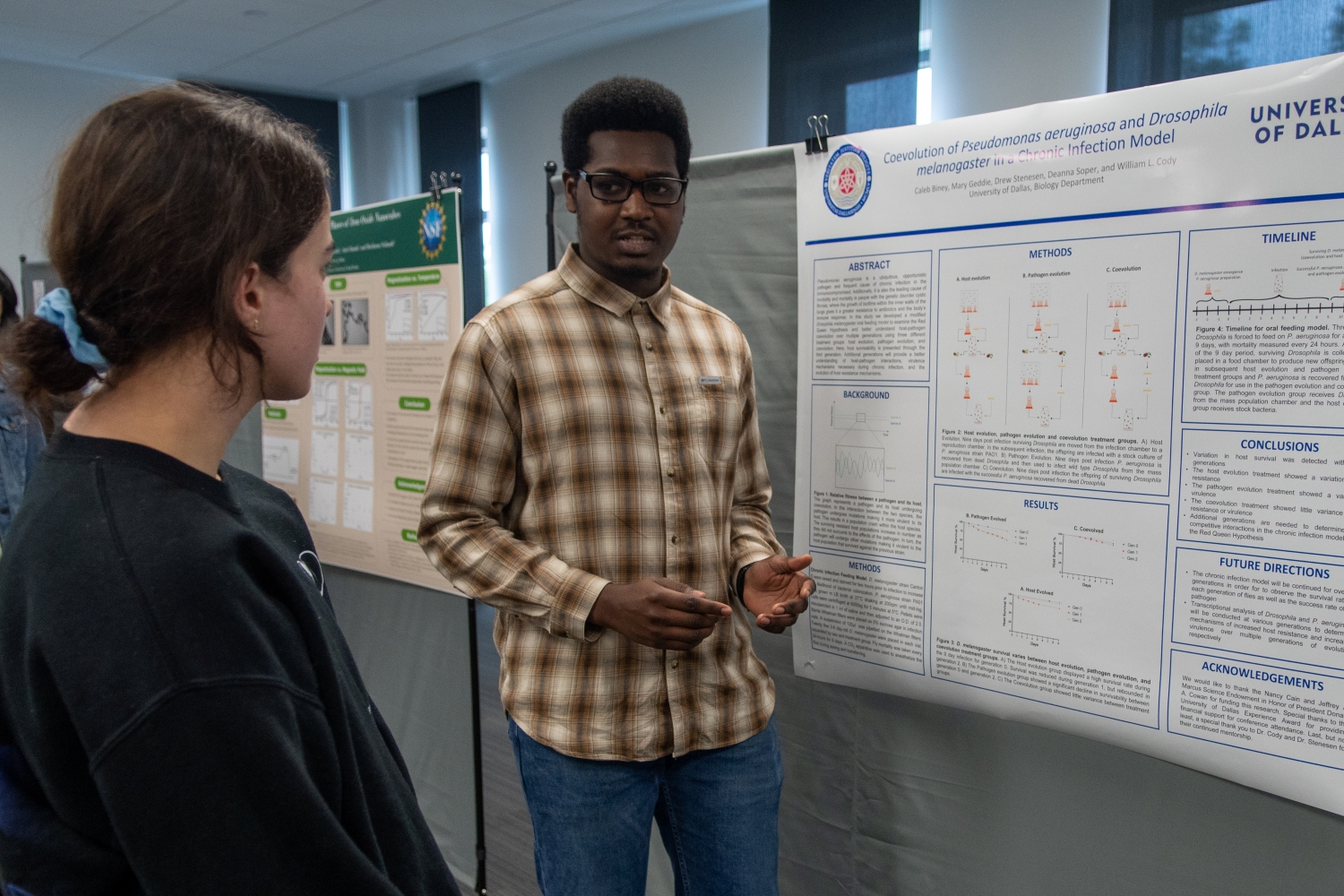
The University of Dallas held its third annual Undergraduate Research Symposium on April 28, 2023. This event highlights the hard work and dedication of undergraduate students from many academic departments.
Project topics included the medieval art and architecture of Gotland, a psychological investigation of birth control, aircraft materials, fatal pathogens, coral reefs and more. Several students had already shown their work at national conferences or successfully submitted their research for publication.
“The Undergraduate Research Symposium, known informally as ‘Research Day,’ is fairly new, but it is intended to be an annual event. It has happened the last few years, spearheaded in large part by Dr. Steinmiller in Chemistry and Dr. Stenesen in Biology,” said philosophy professor Matthew Walz, Ph.D., associate dean of the Constantin College of Liberal Arts.
“An email is sent to all students soliciting proposals. The goal is that every proposal submitted will result in a presentation, either a poster presentation or an oral presentation.”
Chemistry Department Chair Ellen M. P. Steinmiller, Ph.D., shared her passion for the symposium she helped establish, noting that students may present projects in the humanities as well as the sciences.
“I think the symposium is one of the most important events that we have on campus because it is a celebration of our students and the work they have generated as a result of their UD education,” Steinmiller said.
“UD has a rich history of students being selected to conduct research at other universities in the summer through programs such as the highly competitive National Science Foundation Research Experiences for Undergraduates (NSF REU). Other students are presenting work that they conducted in UD faculty research labs.”
The poster symposium began in 2018 with 30 students presenting research in math and the sciences. Steinmiller says the idea first took shape on a road trip.
“The poster session originated from a conversation I had with a group of chemistry students as we were driving back from a conference,” she said. “We were brainstorming ideas on how we could promote the research of our students, so we decided to organize a poster session in conjunction with National Undergraduate Research Week.”
After the success of the first symposium, and with the support of physics professor Sally Hicks, Ph.D., former interim dean of Constantin College, the symposium returned in 2019 and grew to include other disciplines. The second annual Research Day included projects from 13 departments, including an art exhibition.
Steinmiller pointed out that UD’s symposium wasn’t the first stop for every project.
“Many of the posters and presentations have already been presented at regional and national conferences. For example, most of the chemistry posters this year had already been presented at the National American Chemical Society meeting in Indianapolis in March, [and] Joseph Beam's physics presentation featured work that was just accepted for publication,” Steinmiller said.
Joseph Beam, BS ’23, a physics major, conducted research from 2020 to 2022 on a material commonly used to coat the blades of jet turbines. The conclusions he reached with physics professor Said Bakkar, Ph.D., and Cerium Labs were recently published in the Journal of the American Ceramics Society. Beam shared that their research found some minor flaws with this coating — known as yttria-stabilized zirconia, for interested readers — and offered a workable solution to improve aircraft efficiency.
As Beam explained in simpler terms, “YSZ or yttria-stabilized zirconia is the top coat of the thermal barrier coating. Basically, it insulates heat from the other parts of the thermal barrier coating. Si3N4 or silicon nitride is a protective layer on top of the YSZ meant to further insulate it and protect it from interactions with certain particles.”
The Biology Department was well-represented at the symposium as well. Several biology and biochemistry majors presented posters, including Caleb Biney, BS ’24, a biology major whose research focused on host-pathogen interactions over multiple generations. To study the evolution of pseudomonas aeruginosa, the pathogen most responsible for deaths of cystic fibrosis patients, Biney worked with biology professors William Cody, Ph.D., and Deanna Soper, Ph.D, to develop an experiment with flies.
“We developed a fly oral feeding model, in which a sample of fruit flies was infected by feeding them with the pathogen pseudomonas. The flies were monitored for 9 days, with every fly death being recorded each day,” Biney explained.
“At the end of the nine-day period, the surviving flies were taken out and allowed to mate and produce new offspring while the pseudomonas growing inside the dead flies was extracted and grown on a plate. The offspring will then be infected with the newly extracted Pseudomonas. We are trying to continue this for 50 generations, which, ideally, would take about two years.”
Another student, art history major Virginia Kendall, BA ’23, followed her research in a different direction. Kendall traveled to Gotland to study the art and architecture of medieval churches.
“On the island, I visited 15 churches, thoroughly examining six of them for their structure, murals, masonry and art objects. Due to the lack of documentation online, my own images and notes were extremely important for my thesis,” Kendall said.
Because of this dearth of scholarship on her topic, Kendall had to rely on her own translation skills as well as her notes. She hopes to publish a book on the subject someday, and she has already presented at the Medievalists and Early Modernists of North Texas and Oklahoma (MEMNTO) conference.
Kendall expressed her gratitude for the support of the late art professors Catherine Caesar, Ph.D., and Lyle Novinski, MFA.
“I would not have undertaken this difficult, under-researched topic, despite my personal connection and interest in it, had [Caesar] not looked me in the eyes and told me, when I asked her, ‘Do you think I can do this?’ ‘Yes. And you should go to the island yourself.’ She was emphatically supportive and her trust in me was really inspiring,” Kendall said.
“As for Lyle Novinski, he and his family generously brought me into their home and were incredibly helpful and encouraging throughout the entire research process. I talked through my work with Lyle and his family frequently, during Friday coffees. It was simply an honor to learn from him, to hear little snippets of his lectures on sacred art, to look at beautiful churches with him, to sit as a student, if only for a little while, under the care of a man who gave his entire life to beauty. These two people are both great guiding lights for me, and I could not have accomplished any of this without their loving constancy and support.”
Steinmiller concluded, “I look forward to this event each year. It is a great opportunity to recognize and celebrate the accomplishments of UD's students.”
